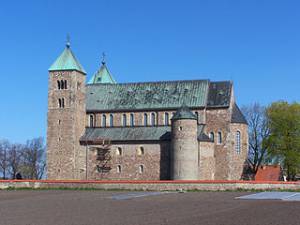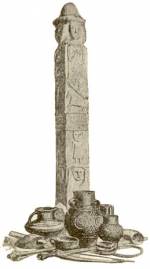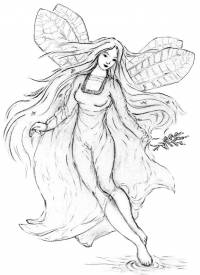Slavic nations
Eastern Europe is a harsh region, where men fight men and beast, where kingdoms rise, treaties are broken, and horrors haunt those who dare stay outside the urban areas at night. For over five hundred years, the Slavs were forming a culture distinct from the rest of Europe or from their neighbours to the East.
History and Politics
For well over 500 years, Slavs have inhabited these lands, holding their ground against both human and supernatural enemies. They banded together - sometimes because that's what survival instinct dictated, but more often it came down to conquering the neighbours. With time they settled into nations as we know them today: Bohemia, Hungary, Bulgaria, Poland, Kievan Rus', each one with its own story to tell. The nations grew in strength and military power, and both Byzantine and Holy Roman Empire started paying careful attention to them.
 The key figures responsible for introducing Christianity to Slavs were Saints Cyril and Methodius, two brothers from Thessalonica. The Slavic states initially followed the Old Ways and did not want to be converted, however their rulers saw it as an opportunity to cement their own power. They noticed that their neighbours weren't keen to negotiate with the followers of the Old Ways, and were indeed looking down upon them. Some nations took Christianity as their state religion for political reasons. Others were forced to.
The key figures responsible for introducing Christianity to Slavs were Saints Cyril and Methodius, two brothers from Thessalonica. The Slavic states initially followed the Old Ways and did not want to be converted, however their rulers saw it as an opportunity to cement their own power. They noticed that their neighbours weren't keen to negotiate with the followers of the Old Ways, and were indeed looking down upon them. Some nations took Christianity as their state religion for political reasons. Others were forced to.
Bulgars and Rusins didn't have much choice after a war with the Byzantine Empire. Bohemia was converted more peacefully, yet still early on - in the 9th century. Generations later, Dobrava of Bohemia liked the idea and introduced it to her ally and soon-to-be husband, Mieszko I of Poland. Mieszko saw it mostly as a way to discourage Emperor Otto from waging a war against him, and to improve the political system in his kingdom.
Following the East-West Schism in 1054, Bohemia and Poland became Catholic, while the Eastern states stayed Orthodox. It didn't really matter in the end, as their rulers had far bigger problems at their hands. Their subjects didn't care what the new religion was called; they were upset that they were being forced to change their beliefs. It wasn't just a matter of faith; the power was taken away from the Elders and given to clergy. The people's ways of life were significantly affected. And the people revolted - for almost 80 years, the Hungarian monarchs dealt with unhappy pagans. They tried turning their attention to other issues, making a war with the Republic of Venice and then Byzantium, but were unsuccessful.
Other countries had their own problems. Kievan Rus' is now falling apart, fragmented into more and more principalities. Poland isn't faring much better, after Boleslava Wrymouth divided the country between her four children fifty years ago. Right now, Bulgaria is in the middle of an uprising against the Byzantine Empire, lead by Asen and Peter, as the people were unhappy with increased taxes. Only the Duchy of Bohemia, closely allied with the Holy Roman Empire, is steadily growing, and Hungary is picking itself up, taking a different approach: it focuses more on education and economy, tending to its trade routes, establishing branches of the Mercantile Guild and sending students to the universities in Oxford and Padua.
Society
The rulers would like to believe themselves modern and “civilised”, accepting Christianity, dabbling with politics with more distant countries, waging wars against each other. They build churches and monasteries, and invite foreign clergymen. They want to force “progress” on their subjects. Their subjects are unwilling.
They are stubborn people, reluctant to change their ways, even more so when they are flat-out ordered to do it. They are convinced that they know these lands better than the rich ones, locked up safely in their castles of stone. They are not wrong. Forest and steppes, mountains, lakes and rivers are filled with creatures that no scholar has escribed and that no noble travelling only on major roads would meet. The peasants have met them, and have struck a deal. Now they coexist, united by disdain towards the new faith.
With the general aversion towards the Church, followers of the Old Ways can find people willing to provide them with food and shelter, much more easily than clergymen and missionaries.
Notable people
- Bela III - King of Hungary and Croatia. The two nations were joined by a personal union in 1173. Some controversies float around with regards to the death of his predecessor and his rise to power, but he's ruling the country with an iron fist.
- Peter IV of Bulgaria - one of the leaders of the uprising against the Byzantium, the other being his younger brother Asen
- Mieszko III the Old, Casimira II the Just, Boleslav I the Tall and Leszek - current dukes ruling the fragmented Poland, occupied with fighting among themselves, although Casimira, having grown up in the Holy Roman Empire, has powerful friends there that she tries to use as leverage.

- Frederika, the Duchess of Bohemia - her rule was challenged a few times, but she kept it with the help of the Holy Roman Empire. Nevertheless, she is not the most popular ruler.
Saints
- Ss. Cyril and Methodius - missionaries from the Byzantine Empire that introduced Christianity to Slavs, also tended to the development of the languages, both spoken and written.
Old Deities
- Dažbog - Sun-god, worshipped across all Slavic nations.
- Perun - god of thunder, usually described as a rugged man with a copper beard and a great axe.
- Svetovid - four-faced deity of war and abundance
Spirits
Not much of the land has been conquered by people. Vast expanses of forests are still indigenous, and a wide variety of creatures lives there, very different to those seen on the British Isles. Not all of them are hostile. In fact, most supernatural beings aren't enemies as such - they don't want to to intentionally hurt humans; they simply want to, how shall we put it… play games. However, their definition of “hurt” and “play” is often vastly different from that of their victims.
 They don't have human mentality, but they certainly are often sentient enough to have deals with their more fleshy neighbours. it is difficult to speak of these creatures as one kind, for they are not. there are many distinct spirits, some known better than others.
They don't have human mentality, but they certainly are often sentient enough to have deals with their more fleshy neighbours. it is difficult to speak of these creatures as one kind, for they are not. there are many distinct spirits, some known better than others.
The most friendly ones are the household spirits; ones that found ways to coexist with humans in peace, and now live under the same roof as them, sometimes even sharing food. They aren't malevolent, and are easily kept contented by offering them a bit of cheese or bread from time to time. In return they will increase the household's wealth, most likely by stealing small items from the neighbours. They take a variety of shapes and forms, from a wet black chicken to a little old person. If annoyed, they would crack plates or make noises at night.
Most creatures are much more cautious with approaching humans. They will also take advantage of them, seeing them as lesser beings. Strigas fly around at night, disguised as owls, and feed on the blood of unfortunate ones that they come across. The servants of Lady Midday are known to turn into small whirlwinds and cause heatstrokes to farmers working in the field.
Many are indifferent about people, as long as they don't destroy their homes. From time to time, the Firebird, in the form of a fiery falcon or peacock can be seen soaring through the skies. Rusalkas and Samodivas live in the untouched forests and mountains, unaware of human politics. Leshy is the personification of neutrality. He is the caretaker of the forests, and protects his home from mindless destruction. However if a traveller is thoughtful and respectful, he would lead them through the woods safely.
Finally some spirits don't seem to be intelligent, but are treated as brethren by the others. Take Bagiennik - the swampling - for example. It's neither a man nor a toad, spending its days in murky waters of the swamps and bogs, with only its eyes sticking above the surface. When scared by people, it will make loud noises, as if a heavy object fell into the water, or will cause the surface to bubble. If angered enough, it will cause a cloud of stinky vapour, that makes people gravely sick. Bagienniks are hunted despite that, for it is believed that their mucus heals many ailments.
And don't chase the white stag. Just don't.
